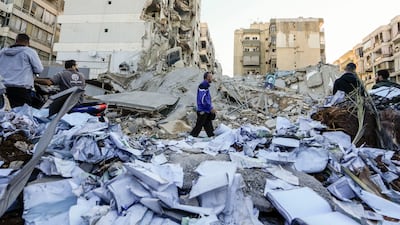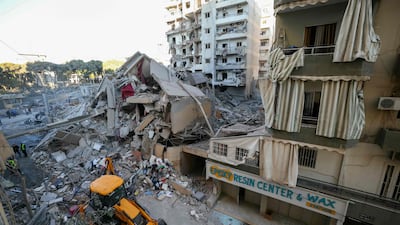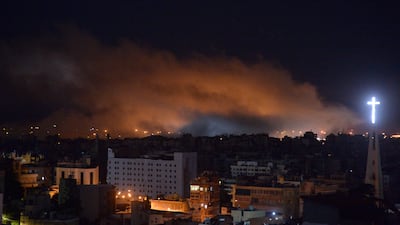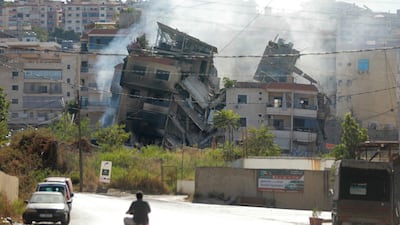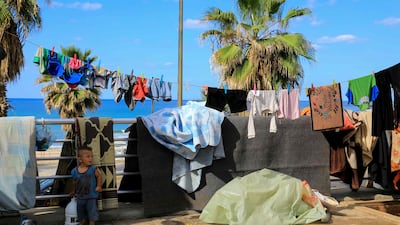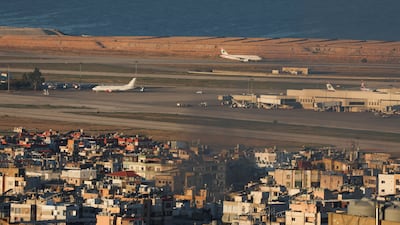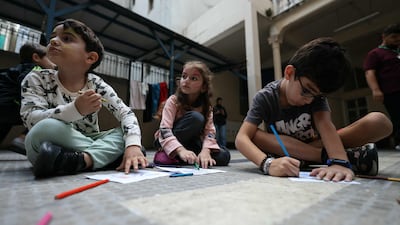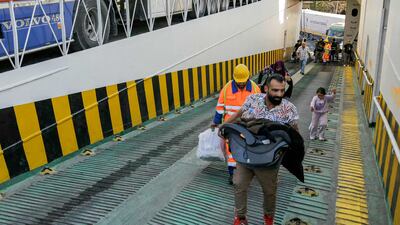Live updates: Follow the latest on Israel-Gaza
US special envoy to Lebanon Amos Hochstein, who arrived to Beirut yesterday in the latest effort towards achieving a ceasefire, said that UN Resolution 1701 which ended the 2006 Israel and Hezbollah war was the basis to end the conflict between the two sides, but that “simply committing” was not enough.
The conflict between the two started more than a year ago, a day after Hamas waged its surprise October 7 attack on Israel, killing 1,200 people and kidnapping 240. It escalated into a full-blown war following the assassination of Hezbollah's leader Hasan Nasrallah last month and Israel's invasion of the country and constant bombings.
The UN Security Council's resolution was agreed to end the last war, but it has never been fully implemented. It states that only the Lebanese army and UN peacekeepers should be stationed in southern Lebanon, while demanding the withdrawal of Israeli forces from Lebanese territory.
Senior Lebanese officials have said they want to put it into effect, but Israel, whose warplanes have entered Lebanese airspace thousands of times without permission, has signalled that even if UNSC 1701 was fully implemented, the terms were no longer tenable.
“The commitment that we have is to resolve this conflict based on [UN Resolution] 1701 – that is what the solution is going to have to look like,” Mr Hochstein said.
“Resolution 1701 was successful at ending the war in 2006 but we must be honest that no one did anything to implement it,” he added, saying: “Both sides simply committing to 1701 is just not enough.”
Mr Hochstein said the aim was ensuring lasting peace and that conflict would not flare up again. “We have to put things in place that would allow for confidence that it will be implemented for everyone.
“We have to know this is not just going to another round of conflict in a month or a year or two years,” he said.
Lebanese caretaker Prime Minister Najib Mikati said there was no alternative to 1701, but that “new understandings” could be reached to put it into effect.
Washington said yesterday that Secretary of State Antony Blinken will make his 11th trip to the Middle East this week, visiting Israel and several Arab nations in a week-long tour.
Israel has reportedly demanded that its forces be allowed to engage in “active enforcement” to ensure Hezbollah does not rearm and rebuild its military infrastructure close to the border. Israel also demanded its air force have freedom of operation in Lebanese air space, according to reports.
Israel, armed and supported by the US, has said it wants to ensure that Iran-backed Hezbollah can never be a threat to its citizens in the north of the country again. Israel continued its aerial bombardment of Lebanon, hitting numerous Hezbollah-linked financial institutions across the country on Sunday.
Mr Hochstein met Mr Mikati, army commander Gen Joseph Aoun and Speaker of Parliament Nabih Berri yesterday. Mr Berri is a key figure and has close ties with Hezbollah.
Both Mr Mikati and Mr Berri have called for the implementation of UNSC 1701.
Iranian Parliament Speaker Mohammad Bagher Ghalibaf was reported as saying last week that his government was ready to negotiate the implementation of the resolution, prompting Mr Mikati to accuse Tehran of interfering in Lebanon's internal affairs.
An Iranian Foreign Ministry spokesman said on Monday that there had been a “misunderstanding”.
“Iran has never had any intention or action that could be suspected of interfering in the internal affairs of Lebanon,” Esmaeil Baghaei said during a weekly news conference.
Last month, Hezbollah was under the impression it had agreed to a ceasefire with Israel to end the fighting. However, that was torn up by Israel the day after when it assassinated Hezbollah leader Hassan Nasrallah in a bombardment of Beirut.
Mr Hochstein, who has served in the Israeli military, is a regular visitor to Israel and Lebanon as the US seeks to find a ceasefire. He helped mediate the landmark maritime border deal between Lebanon and Israel in 2022. The two countries are technically in a state of war and do not have diplomatic relations.
Israel's bombardment of Lebanon has killed about 2,500 people and displaced more than 1.2 million.
On Sunday, an Israeli attack on a Lebanese army vehicle in south Lebanon killed three soldiers. Israel claimed that it thought the vehicle belonged to Hezbollah. The Lebanese army has not been involved in the clashes with Israel.
